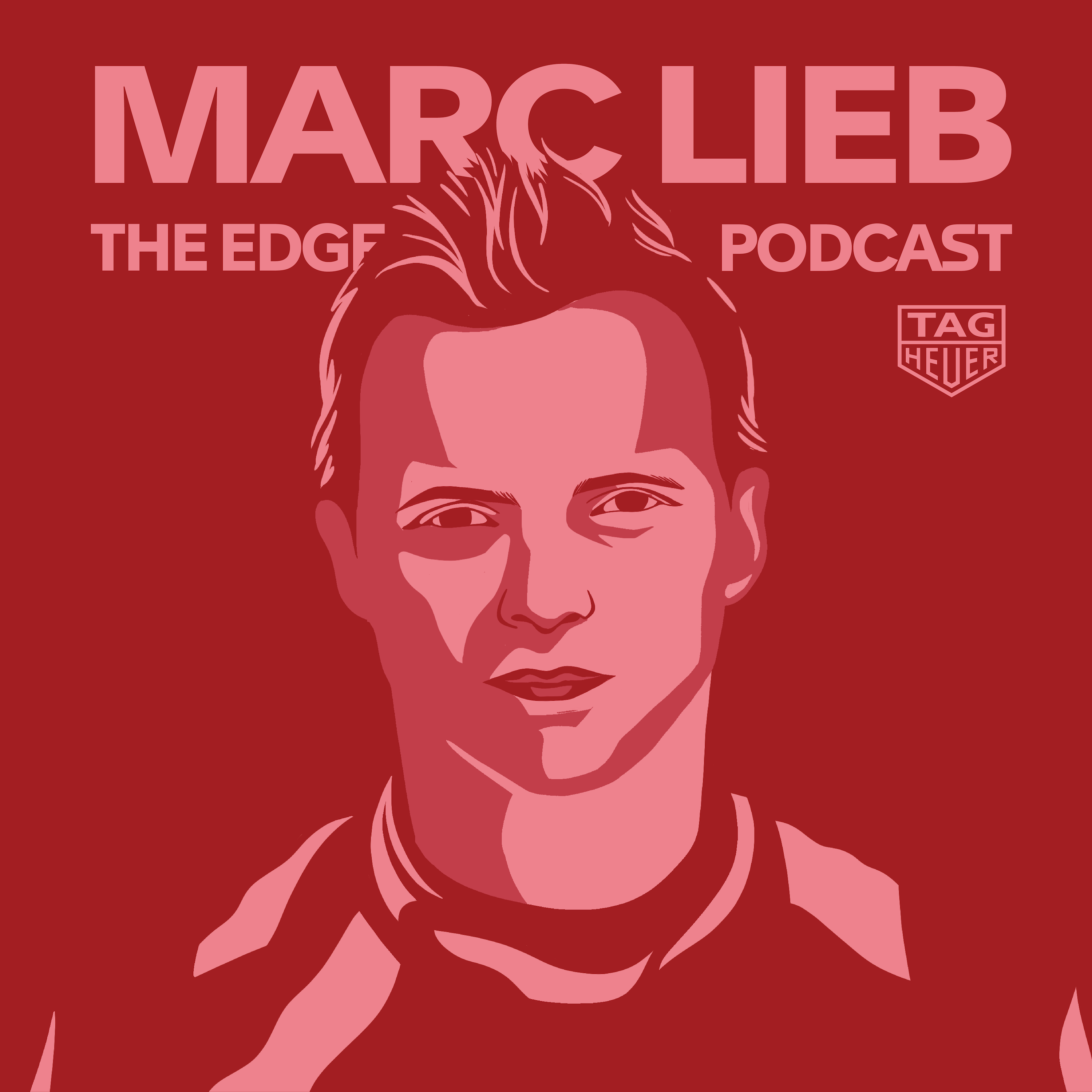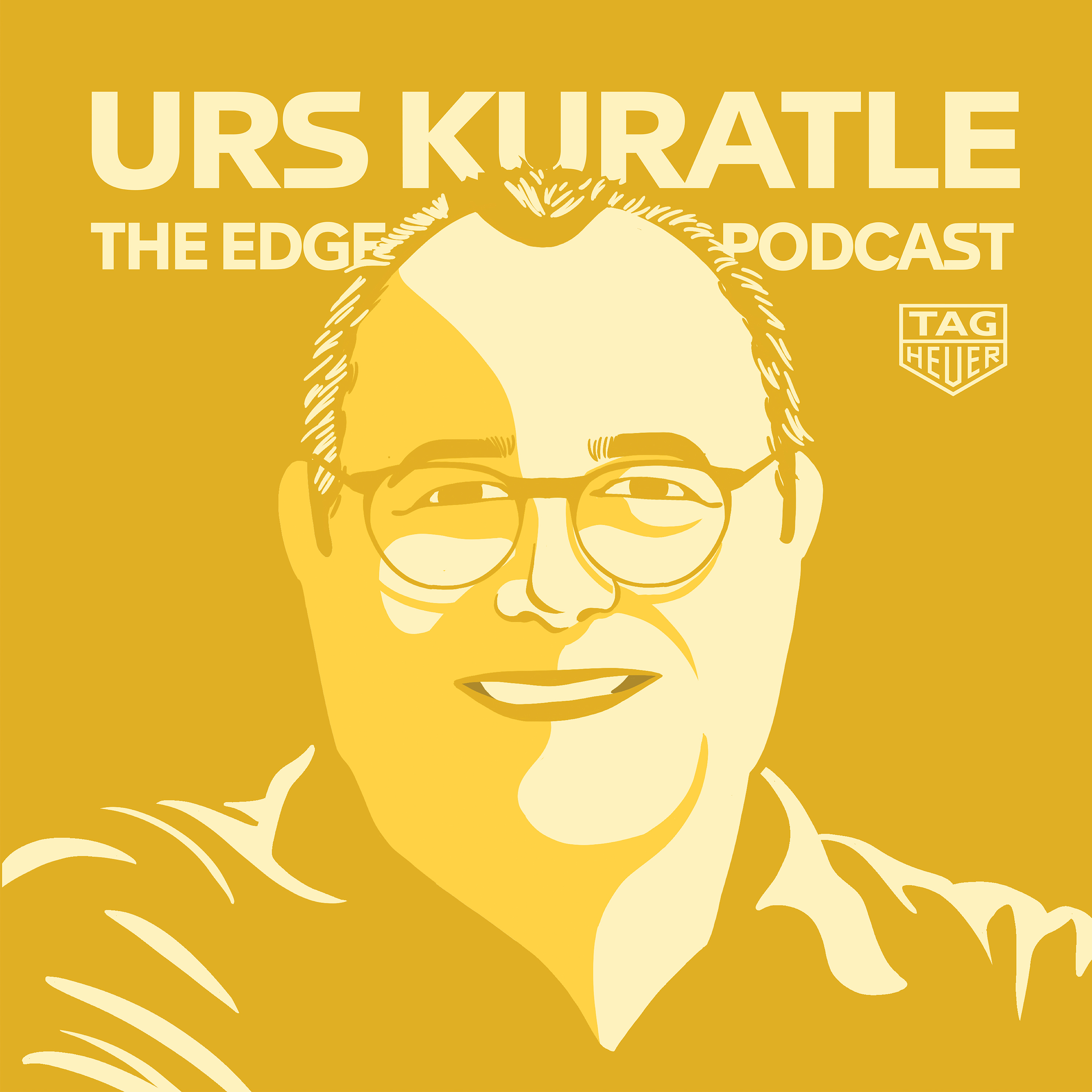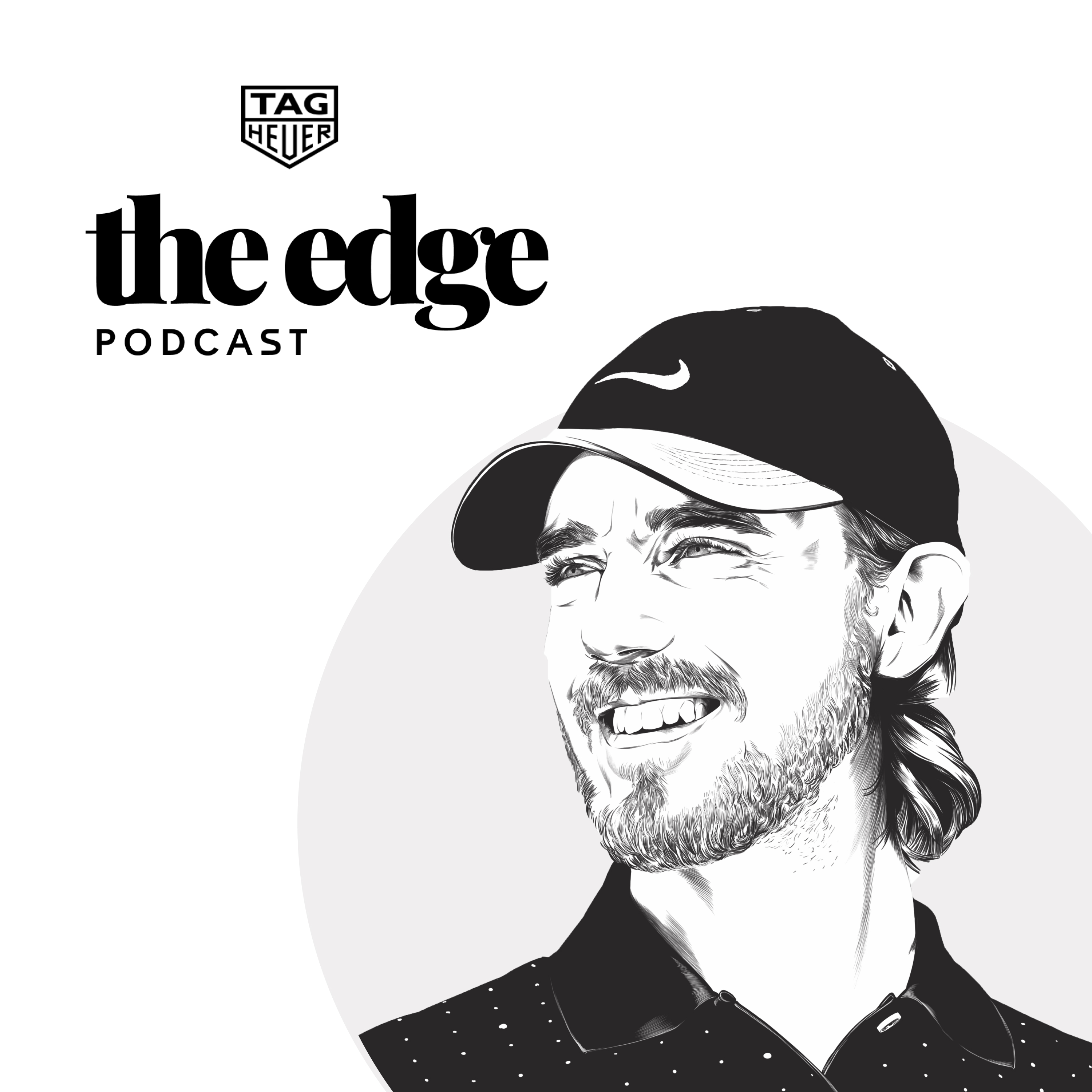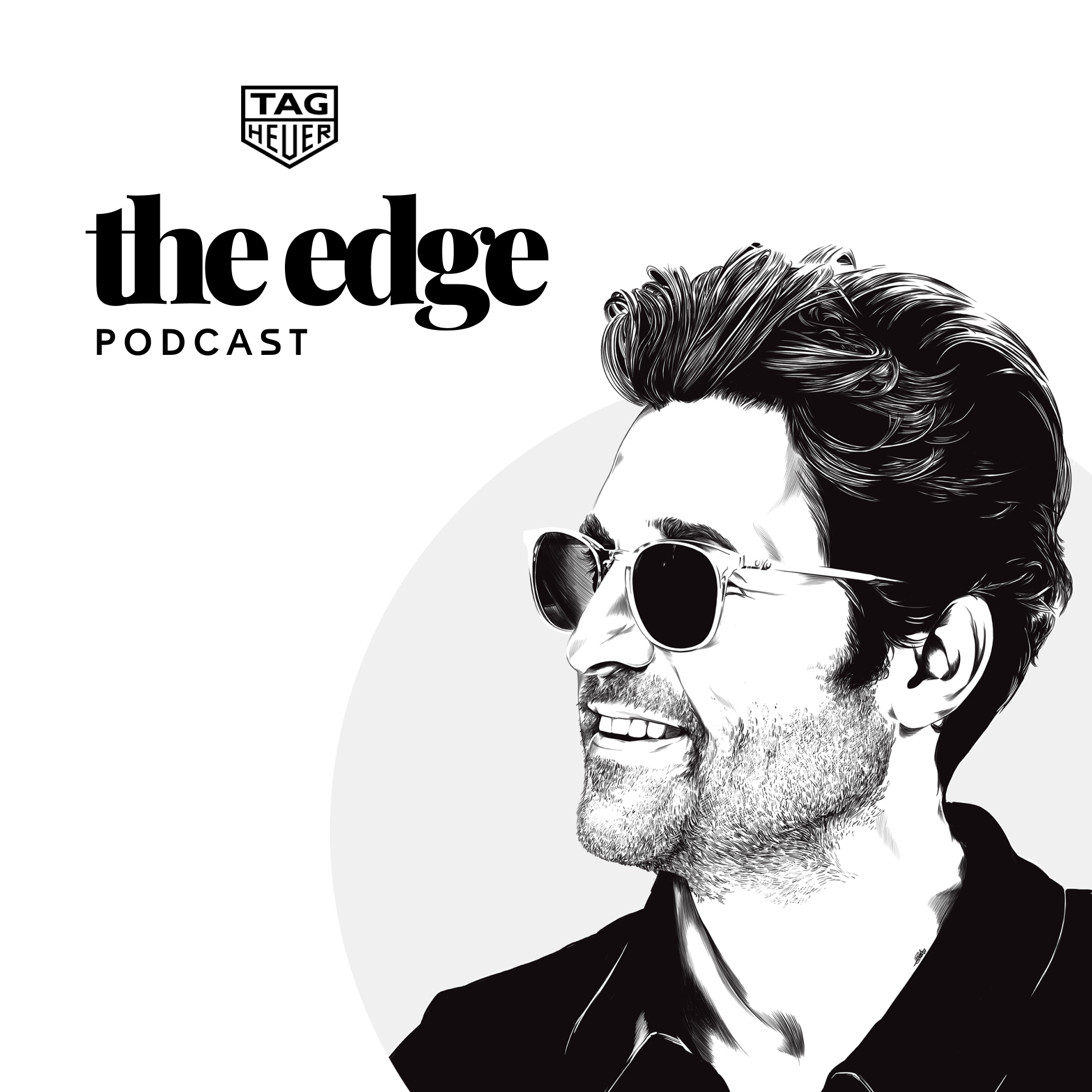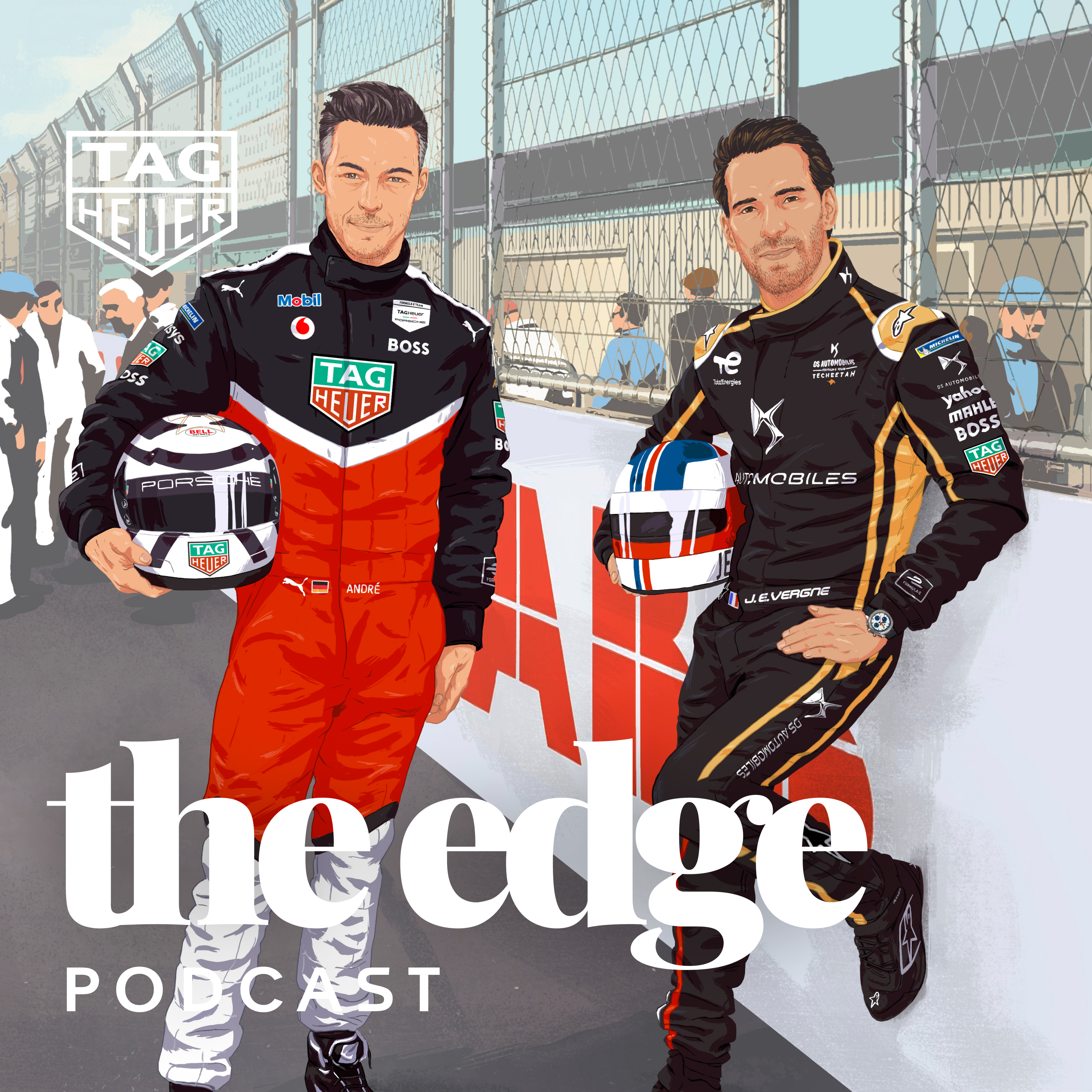Episode Transcript
Speaker 1 00:00:03 It's the 8th of June, and I'm recording with Mark Lieb, former f i a World Endurance champion and Porsche factory motor racing driver, who is at 24 hours of Lamar while I'm on the other side of the English channel. Mark thrived in the world of endurance racing for nearly two decades. He won the F I A GT Championship in 2003 and 2005, and the European Lamar series in 2005, 2006, 2009, and 2010. He also dominated the 24 hours, no burging winning it four times live from the hundredth 24 hours of Lamar, a race he won in 2016. Mark recalls the moment that jumpstarted his career. He also tells us why Lamar is so special and gives us a unique insight into the mind of an endurance racing driver. I'm Teo Van brca. Welcome to the Edge, A podcast by tag Hoya. Mark Lieb, champion Racing Driver. Thank you so much for joining me at the Edge. I'm really excited to have you here. So the first question mark, is when and how did you realize you wanted to become a professional driver?
Speaker 2 00:01:17 Actually, um, that was quite early when I was a young kid. Um, was really interested into motor sport, into racing. My dad and my grandfather were big racing fans. Uh, never been really involved in racing. So I started go-karting when I was five years old. And I mean, first time you sit in the go-kart with an engine, uh, you definitely, you know, yeah. It started to to become a dream, to become a professional racing driver in, in that early stage. I mean, we did it as an hobby, but uh, it was quite clear that, uh, this would be my dream job.
Speaker 1 00:01:45 Fantastic. Okay. That, that's, that's, uh, an amazing thing to realize. So young. Um, did you know that you wanted to become an endurance driver from the beginning?
Speaker 2 00:01:55 Uh, to be honest, not, I mean, everyone who's doing go-karts and single seaters, when you're young, you're dreaming about Formula One. That's the, that's the ultimate goal, um, of a racing driver. But, um, my dad was working for Porsche in the eighties. Uh, you know, he is apprenticeship, so he is a Porsche guy. So I was always following, uh, sports cars and, uh, especially the eighties with the group C, the 9 56, the 9 62, uh, my first, um, racing suit in go-karts was a replica Rothman's Porsche. So, uh, I knew about sports cars and I always loved it, enjoyed it. Um, we always drove to Hockenheim, uh, when the sports cars were driving, so I always had it in, you know, in my mind in endurance racing. Um, but it actually really became a lot clearer when I joined Porsche in 2000 as a Porsche Junior driver, where single seater was basically over the Korea and then the sports car career started. And I have to say, um, it's just a beautiful, um, type of racing, uh, the, the team sport, you know, it's such a, a big effort. So I really enjoy doing it, and, uh, I think it's, it's, it's a great category of motorsport.
Speaker 1 00:03:02 Um, I get the sense that it's a much more kind of purist sport for real motoring enthusiasts. Would you say that's correct?
Speaker 2 00:03:10 Um, yes. I mean, for sure. Uh, you know, when you compare it to Formula One, formula One is, uh, is probably the, the, the bigger show and it more people know about, uh, F1 than probably sports, car racing. But when you look at, uh, the 24 hours of Lemo, it's just one of these, uh, races. Everyone, or most of the people know, it's one of the biggest events in motorsports. When you have the Indie 500 Monaco Grand Prix, it's probably then 24 hours of limo. So, um, I think it's pure because you have these, um, amateurs, you have professionals, everyone is racing together. Everyone wants to, uh, just enjoy the driving, enjoy the challenge, um, you know, taking, uh, attacking this, uh, this, um, Mount Everest of, of a race. You know, a 24 hour race is so long. You need so many people, uh, so many mechanics. Um, it's such a big team effort and it's such a special place, and that's why, you know, it's probably one of the purest, um, Motorsport categories we have.
Speaker 1 00:04:11 So was there a key moment that has defined your career thus far?
Speaker 2 00:04:15 In my opinion, or in my, in my case, definitely was, uh, when I joined Porsche in, uh, 2000 because I was a, uh, you know, a poor, uh, young racing driver who, who was dreaming about a single seat career. And basically my career was finished because we're running out of budget. I didn't have a management. And then the opportunity came up with, uh, uh, with Porsche to join the junior team, and that definitely gave me the opportunity to become a professional racing driver and, uh, to be able to do motorsport on a professional way, um, uh, you know, to, to make, uh, make a living out of it. So this definitely was, uh, was a changing point in my career, and I'm really thankful, um, that I could do this for, you know, almost 17 years with Porsche. And it's just a, it was a great journey and, uh, definitely the invitation at that time in February, 2000 when I got, uh, the letter from Porsche the day doing a junior shootout. And if I would take part, uh, would like to take part was, uh, the change point of my career.
Speaker 1 00:05:15 Yeah, it's amazing hearing all the cars in the background there, <laugh>, just to explain it to listeners, it's
Speaker 2 00:05:20 A, it's actually the project career cup. So, um, they're racing right now, so they have, uh, they free practice too. So it's, uh, it's a nice background having, uh, uh, around 65, uh, 9 11, 23 cup cast running. Uh, it's, uh, it's amazing.
Speaker 1 00:05:35 Wow. Wow. That's, that's a perfect backdrop. So you couldn't make it up. Um, tell us about the first race that you won and how it felt
Speaker 2 00:05:45 You win races already in go-kart. So the, the feeling crossing the line first is, is always special. And, uh, uh, when you look at big races, you win, of course, it's, it's even more special. But, uh, I would say the, the biggest one, um, where I really, you know, which was one was very important, was my first win in app Porsche. And this was in, in 2002 in the junior team. And, um, this felt so good because it just was such a relief because, uh, you know, I was struggling a little bit for two years. I was very unlucky sometimes and never made it happen. And then suddenly when you win the, a race in a Porsche, and, uh, I will never forget this, uh, this feeling. And then there were so many other victories and, and moments and memories. So, but the first one in a Porsche, uh, was very special. And, uh, I will never forget.
Speaker 1 00:06:35 Yeah. Amazing. I mean, and what about the most difficult race you've ever had? Well,
Speaker 2 00:06:40 Of course, when you have <laugh>, when you do so many races, there are really difficult ones as well. And, um, you know, probably also won, which was very difficult, which we won was, uh, in 2013 was Lemo. Um, this was, um, very difficult because, you know, we lost a, we lost a friend, we lost a mate in, in, in the race, so it was Alan Semon, uh, Danish driver. He drove for, for Aston Martin. And, uh, he had a crash and like the third lap of the race. And, uh, I was racing, I was still in the start, so I could see, um, the accident behind me in the rear mirror. And, um, this was, uh, the toughest moment in my career to basically, you know, you, you're getting out of the car after the first two hours. Um, you don't know what really happened.
Speaker 2 00:07:25 You asked the team, you know, is he okay? You don't know. And then like, uh, one or two hours later I was having, I was having dinner, um, you know, the news came out that, uh, that he died. And then to continue the race, uh, and to motivate yourself to going back into the car, uh, was one of the toughest challenges I ever had. And this was, uh, it's actually 10 years ago now, so it was in 2013. And, um, it's, uh, it was tough and it was, uh, one of the worst races I've ever, I ever did.
Speaker 1 00:07:53 God, I bet. I mean, does that, does something like that make you think twice about racing again?
Speaker 2 00:07:59 No, because we all do, uh, we all have the passion. We know that we, you know, we have the risk, the risk I al will always be there. I mean, safety, there's so much things, uh, which has been done over the years, uh, with safety compared to, you know, when I started in 2000 and now how safe the cars are. Um, you have to say they always developing this, uh, but at the end there's still the risk, you know, but we all know about it. And, uh, we just love and we are passionate about the sports and, uh, um, we will always, uh, you know, continue racing because, uh, that's what we all, that's what we all love. And, uh, that's, that's why we're doing it.
Speaker 1 00:08:35 What do you think matters most in the process of winning an endurance race? Is it the car, is it the drivers? Is it, is it the circuit? What's, what's the kind of key element?
Speaker 2 00:08:44 Wow, that's very difficult because there's, so, I mean, you mentioned all the key elements. It's, uh, it's basically a team sport. You need a good car, you need, uh, a good team, uh, you need the good drivers. Uh, you need, the preparation has to be done, you know, such a process. For example, with the 9 63, I mean, how many endurance runs they do before the 24 hours in Lamar, you start already, uh, the year before in December, with the first endurance test, you do like 36 hours, uh, then you do another one in February, you do another one in, uh, in May. So this is just the preparation you need the details development, uh, from the f manufacturers, the engineers, uh, mechanics. So it's a big operation and, uh, you just need the little, uh, you know, it's like the recipe. You need everything in the right amounts and, uh, in the best way. And then you can, uh, win races. But it's, uh, it's very complicated. It's a complicated sport because it's so technically as well. Um, and, uh, for me, the guy who's driving the truck to the racetrack has the same, you know, the same amount of, uh, uh, like part of, of the team effort. And when we win races, uh, the truck driver is also the guy who won the race, in my opinion.
Speaker 1 00:09:56 Yeah, that's lovely. Um, how do you deal with the pressure though? Cause yeah, obviously that's, that's all great, but the reality is the driver on the track is the person who, as we've just discussed, is taking the risk and is doing the kind of real grunt work of the thing. Um, how do you deal with the pressure of that?
Speaker 2 00:10:13 Uh, you, you grow into it? Um, of course, uh, that the pressure is always there because everyone is looking at you. And as a driver, um, especially in motorsport, um, your performance is so visible is, is so visible. I mean, you now, nowadays you look at the lap times, you have sector times, everything you do is obvious, is clear, and it's comparable. So this is one part of the, of the pressure you have to handle. If you're not having a great day and your teammates are faster, you have to accept that. And on the other hand, you know, you are driving for a big operation like Porsche Motorsport, uh, the board members are there, there's a lot of pressure. They expect you to win. Uh, and if you do a small little mistake in the race, it can be over and all the preparation for years, months, weeks money, you know, effort from all the team, uh, you're responsible for it. So there's pressure, but you can handle it and you can cope with it. But yes, uh, I can tell you before the start of the 24 hour race, like the few minutes before you're really shitting yourself, it's just really, really tough. It's really, really hard to, uh, uh, to feel the pressure. And it always gives me goosebumps, even today when I'm before the start, watching the driver standing out there, even though though I'm not driving myself, it's just unbelievable to get the atmosphere. And I always get goosebumps at Lamar.
Speaker 1 00:11:29 I bet. It's okay. So let's talk about Lamar in honor of the centenary, which is this weekend, which is a very big moment for the race. Let's go back to your time. When did you first attend the race, and how did it feel? What did it kind of in incite in you that, were you nervous? Did you have any hopes of winning?
Speaker 2 00:11:47 Um, you know, in, back in the days, it was in 2003 was my first Lamar. Uh, we would, as a factory driver, we didn't have a full factory program, so we were, um, you know, sent to customer racing teams in gt. And, uh, for me it was just a great opportunity. Um, they told me, yeah, you, this year you can drive Lamar. I was like, oh, that's very cool. You know, I know the, the movie Lamars McQueen, so you have already like a feeling that it's a big race and it's, it's a huge opportunity. But this is, I mean, so far away from the reality because when you are here, when you enter the track, when you enter this this week, it just completely blows you away. I mean, the, the, the, the, the, the, the greatness, the, the atmosphere, the people here, everyone, the, the whole city.
Speaker 2 00:12:33 It's just something you really have to feel and you have to, um, come here and, and get the experience because it's, it's amazing and it's just so, so big. And on the weekend, um, I'm looking a little bit after Axelon Swin, who's actually racing in the Cora Cup, and he came here and he, you know, this is a guy here, he has done the, the kids blue race and, you know, downhill skier, completely crazy. And he came here and he said, everything is so big, it's amazing. I said, yeah, it is. It's absolutely amazing. And this is, uh, this special atmosphere in Lamar. It's just huge. It's this, uh, heritage. It's this, uh, greatness. It's such a cool format. I think everything is perfect, in my opinion. It's just how every race should be like that in the, in the whole world. It's just fantastic.
Speaker 1 00:13:19 Amazing. Let's talk about your 2016 win. Um, how did you specifically, how did you prepare for it and how did you go into that race feeling?
Speaker 2 00:13:30 Um, it was already the, the third year for myself in the, in the big category in the prototype. So before that, we were, I was always racing in the GT category, and you know, at the beginning in 1415, everything was, uh, really exciting and the, the pressure was building up, and I really wanted to win that race in 16. Uh, I knew we had a great car, uh, great teammates, and we were prepared well, but you need luck to win that race. I mean, that's obvious. Uh, you can, you can be on your peak performance, everything can go right. You have a and you have an accent, you are out, uh, you, you know, you crash with a slower car or you have a puncture or something. So this is something you just, you can't, you can't control. And, um, the approach was definitely to, to go there, to just trying to, to perform on my, on the best way I can, I can.
Speaker 2 00:14:17 And, uh, this was the ultimate goal to be there and, uh, to show the best mark leap, it's possible. Uh, that's how I prepared, uh, mentally, physically, uh, with the team. And, uh, it was a really good spirit because, you know, it just, it went like that. I was very happy with, um, you know, most of the time, so let's say 99% of the, of the, the driving you do afterwards, you hop out and you, you think like, ah, I could have done that a little bit better. Mm. I had a small mistake there. And it's always this type of, um, you know, self criticism you always do, or at least what I did. And, um, 2016 LeMar was one of these races where you hop out of the car and I was really satisfied with my own performance, which is very rare, and that's why I rate this, this race very high.
Speaker 2 00:15:05 And I got out of the car after three or four hours and I was just happy because I was really happy with the performance I did. And this is something which is very rare, and that's why 16 was very special. And, uh, as I said before, you need the luck to win it. And we had it as well. So this is something, you know, this, uh, with the Toyota stopping on track, uh, four minutes to the end, he was leading the race. We were quite unlucky before that. We were always catching back, and then we had a puncture, or we had some incidents. Um, it was a tough one. Um, and at the end, uh, which just got, we got the race win, uh, which was unreal. Um, surreal, uh, to be honest, because the feelings, the mixed emotions we had was just, um, I've never experienced it ever in my life, uh, seeing other competitors, you know, stopping on track four minutes before the race because, you know, you understand that they did the same thing.
Speaker 2 00:16:06 They did also, the preparation they had the long endurance tests they had, uh, they prepared physically, mentally, all the effort they put into this race. So it was really tough to see. And on the other hand, being so, I mean, so happy, uh, to win that race. And it was just, uh, a crazy, because you, I mean, this is something I really can't describe, um, to being so lucky, so happy to win that race. On the other hand, being also sad and feeling for them because they were not able to get that victory they deserved as well, in my opinion.
Speaker 1 00:16:39 How long do you allow yourself to kind of revel in the glory? Like, are you thinking very quickly afterwards, right, I've gotta prepare for the next race now? Like what, how, how long can you luxuriate?
Speaker 2 00:16:51 Well, it's, it depends on, you know, but uh, normally after the more is, it's already before, the more so, you know, you have like maybe the Monday, the Tuesday really, you're really exhausted. You're sleeping the whole day, you're enjoying your victory. You have some interviews and some stuff, which probably takes another week. And then the preparation and your head is already thinking about next year. Uh, that's the truth. I mean, uh, it's the, the race is, uh, it's always a continuous preparation and, uh, but it's, this is why it's always also so special because this is the highlight of the year, and that's, that's what you prepare for.
Speaker 1 00:17:30 I mean, it's a weird thing though, right? Like your entire years work is kind of predicated on this very brief. I mean, it's not that brief, obviously it's 24 hours, but of a very brief moment. Um, that's a lot of pressure there. There must be, you must know that there's like a time limit on that. You must know that you are not gonna be able to do that forever.
Speaker 2 00:17:53 Yeah, it's true. Um, there's, um, I mean, we have, I have, uh, friends, driver colleagues who, who, who are doing their 25th limo or something now. Uh, and this is, you know, I really don't know how they do it because it's so mentally exhausting and, uh, these guys, they're just, uh, they can't stop. It's like an addiction and, um, it's, it's crazy. Yes, because, you know, all what we do is for one race per year, and, uh, yes, we have the WC Championship, the World Endurance Championship. Uh, we are racing and it's nice to win the championship, and it's nice to win, uh, at the end of the year, and you can call yourself a world champion. But to be honest, a 24 hour at Lamar victory is so much more important for us than, than the world championship, which is crazy. You know, it's, I mean, it's, it's one of the, uh, three FAA world endurance cha uh, FAA world Championships next to Formula One, next to Formula E and, and the Rally championship, it's the World Endurance Championship, but Lamar is so much bigger than, than this. It's just, uh, yeah, it's crazy. Mm.
Speaker 1 00:19:02 I guess that is kind of mad. It must, it must irritate the organizers of the other race. Um,
Speaker 2 00:19:07 Yeah, and this is something, you know, why the, it's, it's, it's why the championship is, is probably also a little bit, uh, struggling, you know, because it's not struggling, but it's not, it doesn't have the attention like the other championships, but all the attention, you know, all the media interests, the sponsors, the guests, they just wanna go. I mean, they wanna experience Lamar, and that's why everyone is focusing on this event. And, uh, yeah, it's, it's, it's a special place.
Speaker 1 00:19:31 Yeah. Um, how did you find your transition from racing into the press department at Porsche?
Speaker 2 00:19:38 Uh, well, yeah. I mean, I was a guy who always, um, tried to, you know, to, to be on, on two pathways. So I always, uh, uh, made sure I finished my school correctly, that I go to university, that I do my studies. So I went, uh, into the engineering department, uh, started engineering, did my bachelor degree, um, was working at Porsche part-time, uh, before the LeMar project. And, uh, afterwards then, um, you know, I decided that, um, you know, I want to use my, my degrees and I want to use my education to do something else, to also probably give something back to the company because I was so grateful that they gave me the opportunity to drive races, uh, to make a living out of it. And, uh, for me, it was clear that I would stop, um, early and then, uh, continue working.
Speaker 2 00:20:27 And, uh, it was, it was a nice transition. Uh, you know, I worked four years in the customer racing department, taking care of the G gt uh, customers. There, uh, was a great experience. And now, uh, in the, being in the communications department, uh, taking care about the, the sports communication is, is really cool. It's just, uh, uh, completely something else. And, uh, also new. And I love, you know, learning new things. Even though I'm 43 years old, that just always drives me, uh, when I, when I learn new things, new stuff, new people understand how big companies are, are working, and, uh, with the knowledge and the experience in sports, I have, you know, I can contribute, uh, my knowledge into the, into this, this department as well. But on the other hand, I can also learn so much, uh, what is going on, uh, on their side.
Speaker 2 00:21:19 So it's, it's a great fit for the moment. Uh, I'm very happy where I am at the moment, so, but yeah, the transition, I can be honest, was not easy. I mean, as a racing driver, you live your life. Uh, the only focus is to drive fast and, uh, to be, uh, competitive there. And, uh, you have, uh, you know, you focus on the racing and, uh, then I remember the first three months I was in the office, or the first day, uh, at two o'clock in the afternoon, I was like, oh, this is a really a long day. I mean, when you start at, at eight 30, and then it's like, I don't know how to do this. Uh, but you get used to it and, uh, it's, it's fine now. So I'm, I'm, uh, after few weeks I was, uh, fully into the, the work work mode and, uh, the racing driver was, was history.
Speaker 1 00:22:04 It's a different type of endurance race, being in an office. Yes,
Speaker 2 00:22:07 <laugh>, yes, yes, yes,
Speaker 1 00:22:08 Yes. It's a long, it's a longer race. Um, finally, mark, I guess, what advice would you give to aspiring young racers who dream of following in your footsteps and making a career out professional motor sport?
Speaker 2 00:22:20 I think the most important thing is the, is the passion. Uh, I think that's, you need to have that passion for, for the sport. Uh, and you have to be a hard worker. You know, it's always improving yourself, con continuously, uh, improving learning, um, yeah, and sometimes being patient, it's just not always, uh, going up, uh, uh, as you would like to do it. And, uh, yeah, just, uh, you know, live your dream.
Speaker 1 00:22:47 Fantastic. What a lovely way to end. Mark Lieb, thank you so much for joining me at the Edge, and I hope you enjoy Lamont.
Speaker 2 00:22:54 Uh, definitely will. Enjoy Lamar. Thank you.
Speaker 1 00:22:57 Thank you. Thank you for listening to this episode of The Edge. If you'd like to listen to more episodes like this one, have a listen to our interviews with racing drivers, max Tappin, Sergio Perez, and Alexander Rossi. If you enjoyed this episode, don't forget to subscribe and leave us five stars. It does make a difference. Thank you so much to Mark Leb for joining us. I'm your host, Teo Vanden Bruker, and I'll be back next month with another episode of The Edge, a podcast by Tag Hoya. See you soon.
